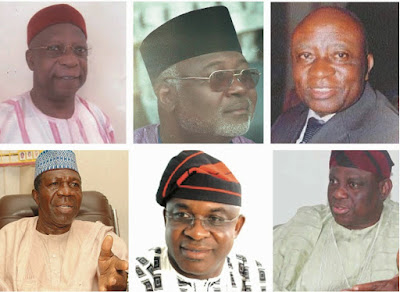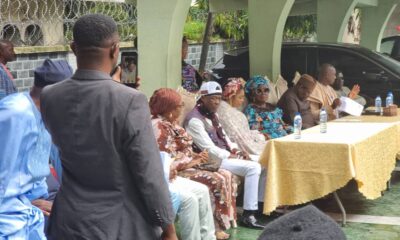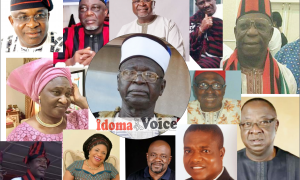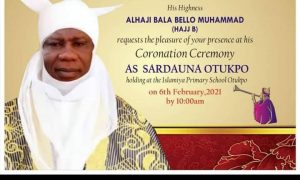(OPINION) The Idoma nation:Yesterday, today and tomorrow – A Clarion Call for Unity
By Onogwu Elias
Introduction:
In this short paper, I attempt a survey of our past and present as a people and project into our future as a nation. I proceed first by taking a look at the historical perspective giving a summary of and political experience in the land the Idoma came to occupy by the 17th century. I will give an insight of our experience in the past 39 years in the Benue polity and suggest a wayforward.
Our History in Brief:
There are many divergent views as to the origin of Idoma people but most historians agree that Idoma people migrated from Apa in Kwararafa Kingdom after her disintegration sometimes in the seventeenth century.
It is believed that Idoma people settled in some parts of present day Tivland like Buruku, Makurdi and Gwer LGAs together with their Etulo and Jukun-wanu brothers before majority of Idoma people migrated and remained in their present location while other speakers of the language can be found in four states of Nigeria, viz: Nasarawa, Cross-River, Enugu and Kogi. A third group live in far away Surinam. Generally referred to as Bush Negroes, these are victims of the Trans-Atlantic slave trade who fled the plantations and escaped slavery and colonialisation for over 450 years.
The Idoma in Historical Perspective
The history of the Idoma is fairly well documented. The pioneering works of Armstrong and the seminal work by Erim have given us a fairly clear outline of Idoma origins and early migrations. We can summarise this history thus:
v Idoma is a language cluster with eight district dialects all belonging to the Benue-Congo group of languages;
v From oral history we know that the original speakers of this language lived in the middle Benue up until the 15th century when as a result of a number of factors they fled their homeland. Their early migrations saw them settling in parts of modern Tivland on the lower Benue.
By 1960 when the nation became independent, the picture of the Idomaland from a political and economic perspective was as follows:
v An administrative entity (Idoma Division of Benue Province) under the Idoma Native Authority that was linked politically to the ruling Northern Peoples Congress.
v A politically suave elite that created a formidable relationship with the ruling elite that enabled them to produce ministers at the regional and national levels as well as senior bureaucrats.
v A well layout administrative and economic capital (Otukpo) that had modern amenities like public water, telecommunication, electricity and a hospital. As economic capital, Otukpo had big yam, rice and timber markets that were firmly in the hands of Igbo merchants.
v A number of post-primary institutions that served the interest of the community and beyond.
v A predominantly rural populace whose economic choices changed little at independence. Migrant labour by males and females, agriculture especially the cultivation of yams, rice and grains remained the major economic activity.
This picture did not change much until the cataclysmic events of January 1966 and its aftermath. As one of the most southernmost divisions of the northern region, Idomaland in general and Otukpo town in particular became a vortex of administrative and subsequently military activities. By the end of the civil war in 1970 it was estimated that of the nearly 300,000 soldiers on the federal side, Idoma division alone contributed nearly 20,000 officers and men.
Does the Idoma Nation have a Strategic Plan for its Development?
The fairly straightforward answer is an emphatic NO. Does the nation need such a plan? Yes it does. The idea of a plan for the Idoma nation was first muted in 1933 when the first Pan Idoma Association, the Idoma Loving Union was established. Its founders stated the need to “promote love, unity and progress for Idoma peoples all over the world”.
One of their objectives was to fight against prostitution that had taken the community literary by storm. More popular than the ILU was the Idoma Hope Rising Union (IHRU) that became the vanguard for elite political and social activity. Politically, the IHRU leaned towards the more progressive oriented national political parties such as Action Group and the National Council for Nigeria and the Camerouns (NCNC).
However, the Idoma Native Authority under the Och’Idoma was firmly aligned with the Northern Peoples Congress (NPC). Ultimately, the IHRU were hounded out by the NPC ruling government and their dreams for a southern leaning Idomaland ended.
By 1973, the Idoma Development Association that had been established in the early 1960s following the demise of the IHRU but had been moribund as a result of the political crisis in the land witnessed a remarkable resurgence.
Driven by Idoma elites based in Lagos and working for the Federal Government like the Ebije Ikwue, the late Ambassador Edwin Ogbu (Och’Idoma the III), Andrew Obeya, James Oche, Jomo Adapoyi, late Col. Anthony Ochefu, Onazi Egwurube and Alhaji Abdu Sule, and Idoma professionals based at home and in other towns like Akochi Adeka, Inalegwu Ella, Professors Ochapa Onazi and Isawa Eliagwu, the late Barr. Joe Omakwu, Chief O. Ikongbe and Ode Atta to mention a few.
The IDA organized a very successful Idoma Development Fund at the Mainland Hotel in Lagos and over 100,000 pounds was raised during the launch and was used in part to build the Idoma Community School at Akpa Otobi. This our fathers were able to achieve this great feat because there was unity. That unity of purpose we desperately need in times like these.
In the past 40 years, the history of the “Idoma nation” can be described as one characterized by a minority people who have been struggling for political and economic ascendancy in a bigger polity dominated by regional and national majority groups. The Idoma have benefited from the political restructuring that saw the Old Idoma Division become three local government areas in the early 1970s (old Otukpo, Okpokwu and Oju). These local government areas became a major component of Benue State that was created in 1976.
Our Journey from Benue-Plateau:
The agitation for the creation of the present Benue State was birthed in Otukpo in 1975/76 when the late Justice Ayo Irikefe’s Panel on creation of States went round Nigeria collating memorandums for state creation.
The only place on record in what is today Benue state which demanded the creation of Benue State was the Idoma speaking area. The memorandum submitted in Otukpo to the Panel was signed by the late Hon. (Chief) Ameh Odo, MP, late Barrister J. Omakwu, late Major Paul Dickson (rtd), late Barrister M. Ogbole, etc. When the Panel went to Gboko, no request for the creation of Benue State was received as none was submitted by the Tiv speaking people.
Our Plight in the Benue we Championed its Creation
Curiously, as soon as the state was created, the Idoma people who were at the forefront of the agitation for the creation of the state began to be consigned to the periphery of power in the scheme of things.
Thus, in the second republic which began in 1979, the first indigenous civilian Governor was from the Tiv area and his Deputy was picked from amongst the Igala, even though the Tiv and Idoma had been together during the colonial administration of old Benue Province and subsequently in the defunct Benue-Plateau State.
Notwithstanding this long period of common association and experience of marginalization, the Tiv did not consider the Idoma for the number two position in the State. Even the short-lived dispensation of 1983 did not witness any concessions being made to the Idoma and so it has been to this day; only God knows when we will be given a fair share in a state we championed its creation.
Tiv people through their professed numerical strength have not relented in their determination to continue the emasculation of the Idoma people. It will be recalled that sometimes in 1993, just before General Babangida stepped aside, the Benue State House of Assembly had passed a motion urging the Federal Government to excise the Idoma people from Benue state and assign them to any other State.
This was the zenith of embarrassment and insult and an unprecedented step in the annals of the political history of Nigeria. The subsequent treatment of the Idoma has continued to follow this trend. The Idoma are nothing more than third class citizens in a State that they championed its creation. The point must be abundantly made that we as a people have not had a fair deal and are not likely to have any in the nearest future within Benue State as it is presently constituted.
And the Injustice and Mockery continues unabated
The situation of marginalization of Idoma and other minority groups in Benue State is getting worse by the day. It is a historical fact, which cannot be contradicted, that in all of 39 years of the administration of Benue State, no Idoma person has ever held the position of Governor of the State, elected or appointed (as happened in military regimes) and same goes for the Speaker of the State House of Assembly and Chief Judge.
It is curious that even a sensitive position like the State Chief Judge which is supposed to be purely on merit devoid of undue political interference is not spared this onslaught as any time an Idoma son attains the height and a vacancy exists for the State Chief Judge, the Tiv would blatantly and openly deny him such.
In fact, beginning from the Second Republic till date, the Legislative arm of government in Benue State has continued to be headed exclusively by the Tiv speaking people of Zones A and B. It was this scenario that got them so carried away to the extent of even toying with the idea that they could excise the Idoma people out of the State, which they actually did, regardless of the provisions of the Constitution of the Federal Republic of Nigeria.
It is disheartening to note also that out of every ten civil servants in the Benue State civil service, only two Idoma or so is noticed, and that mathematically translates to the ratio of 2:10. Invariably all the major positions are dominated by the Tiv.
Are we not Qualified and Competent?
The question may be asked, “Don’t the people of Zone C have qualified and competent manpower? On the contrary, the people of Zone C are blessed with over 100 professors in various fields of study, many of whom are reference points in their chosen careers.
Yet, the Vice Chancellors of both the Federal University of Agriculture, Makurdi, as well as the Benue State University MUST always come from amongst the Tiv, since their inception. Again, Zone C boasts of having over 500 PhDs today, many of whom, being in the academic setting, are on their way to becoming professors. Inspite of the fact that we parade well-qualified and enviable dossiers in all strata of human disciplines, yet, in the two institutions mentioned above, you could count the number at your finger tips that head Faculties or even Departments.
Though the Idoma man is seen as “not being qualified” in his own state to occupy some positions like the Vice-chancellor of a university of Benue State University and University of Agriculture, God has been kind to us as our sons have variously been VCs in places like Uni-Ilorin, Uni-Abuja, Nassarawa State University, Keffi and Kwararafa University Wukari and have excelled. Even the State Chief Judge which has become the prerogative of Zone A and B was once occupied by one of our illustrious sons Justice George Idenyi Uloko who was one time Chief Judge of Plateau State.
Lopsided citing of Industries
If the Tiv dominated government of Benue State is in gross breach of Section 14(3) and (4) of the 1999 Constitution of the Federal Republic of Nigeria (as amended) in the area of staff recruitment/appointments, then the conduct of the State Government in the citing of industries is nothing but criminal, to put it mildly. Or else, how would one describe the table of distribution of industries as seen below?
Industries located in Zones A & B, i.e. Tivland)
1. Benue Breweries (Makurdi)
2. Fertilizer Blending Company (Makurdi)
3. Benue Cement Company (Gboko)
4. Benue Agricultural Dev. Company (Makurdi)
5. Benue Bottling Company (Makurdi)
6. Benue Plastic Industry (Makurdi)
7. Benue Paper Packaging Company (Gboko)
8. Abinsi Roof Tiles (Abinsi Gbaiimba)
9. Benue Printing and Publishing Company (Makurdi)
10. Katsina-Ala Fruit-Corn Company (Katsina-Ala)
11. Gboko Fruit Juice Company (Gboko)
12. Benue Agro Millers (Makurdi)
1 a Ikonge Cattle Ranch (Gboko)
14. Benue Hotels (Makurdi)
15. Hawaii Agromillers (Makurdi)
16. Benue Property and Investment Company (Makurdi)
17 Ikwe Wild Life Park, Igbo (Aliade)
18. Benue Links Company (Makurdi)
19. Taraku Oil Mills Ltd. (Taraku)
20 Sheraton Hotel (Makurdi)
1. Benue Breweries (Makurdi)
2. Fertilizer Blending Company (Makurdi)
3. Benue Cement Company (Gboko)
4. Benue Agricultural Dev. Company (Makurdi)
5. Benue Bottling Company (Makurdi)
6. Benue Plastic Industry (Makurdi)
7. Benue Paper Packaging Company (Gboko)
8. Abinsi Roof Tiles (Abinsi Gbaiimba)
9. Benue Printing and Publishing Company (Makurdi)
10. Katsina-Ala Fruit-Corn Company (Katsina-Ala)
11. Gboko Fruit Juice Company (Gboko)
12. Benue Agro Millers (Makurdi)
1 a Ikonge Cattle Ranch (Gboko)
14. Benue Hotels (Makurdi)
15. Hawaii Agromillers (Makurdi)
16. Benue Property and Investment Company (Makurdi)
17 Ikwe Wild Life Park, Igbo (Aliade)
18. Benue Links Company (Makurdi)
19. Taraku Oil Mills Ltd. (Taraku)
20 Sheraton Hotel (Makurdi)
Industries located in Zone C (Idomaland)
1. Benue Burnt Bricks (Otukpo). It will shock many that out of a number of twenty-one (21) industries spread across the three senatorial districts of Zones A, B and C, only one Industry is located in Zone C! More pathetic and heart-rending is the fact that even this single industry sited in Zone C became moribund soon after commissioning due to poor funding and neglect on the part of the State Government, and has been so for nearly two decades now!
We will note with astonishment too that almost all the fourteen local government areas in Tivland has a General Hospital established to carter for the needs of their citizens, but mention how many General Hospitals you can find in all of Zone C. I don’t think it is the duty of a Senator to carryout these state related development projects.
Where Do We Go From Here?
Let me conclude this presentation by imploring NAIS to critically and passionately assess our yesterday of economic woes, political marginalization and social embarrassment in the Benue polity and our today of even more continued marginalization and enslavement in the State with a view to making far-reaching decisions to give us a better tomorrow. The future is in our hands.
I guess our tomorrow shall be more precarious and disastrous if we cave in to the antics of our oppressors and tormentors disunited, as they seek to have us do now; hence it behoves us to imbibe the virtue of love, unity and oneness. As the popular saying goes, united we stand, divided we fall.
The Tivs do not have anything good for us; they cannot mean well for us; they can’t be helping us in any way by deciding for us whom our Senator should be; they are out on a sinister purpose; the Tivs are hell-bent on dragging us from any little height we might have climbed already. You can even see it from their opposition to Audu Ogbe’s ministerial nomination. The Tivs already have driven us to the extreme margin in their marginalization process.
To allow them the luxury of deciding whom our Senator should be, I strongly hold, is tantamount to mortgaging our entire destiny. If we keep quiet and allow them have their way as they seek to do now even with state resources, the same resources that cannot be used to develop Zone C, but to be used in destroying and diving us, then I fear it will not be long they will equally toy with the idea of dictating to us even whom we should marry or not marry.
Let’s think Idoma, let’s put Idoma first before our partisan interest. Our tomorrow is involved here. It’s not about Daniel Onjeh or David Mark first, it’s not about PDP or APC yet, it’s about our tomorrow as a people. Let’s read in-between the lines and make meaning of these events unfolding.
Awake O compatriots! This is a solemn call to service that we must not negate. Doing so would amount to our total and complete enslavement. Let us in unanimity arise to salvage our fatherland from divisive tendencies, that if allowed would drown us all in an ocean of economic, political and social backwardness in time and eternity.
This land belongs to us and generations yet unborn. We cannot afford to fail or disappoint our elites who toyed and sacrificed centuries back for the growth and development of Idomaland, hence we must all close ranks and work to promote the general good of the Idoma nation.
There is a dire need for strategic thinking if the dreams, aspirations and ambitions of our people are to be realized. May we collectively and in one voice say a resounding NO to this modern day apartheid-like treatment, colonialism and imperialism. All Idoma sons and daughters who have the interest of Idoma at heart must champion this call. It looks to me, THE VOICE OF ESAU AND THE HAND OF JACOB is at play my brothers. Let us beware! To be forewarned is to be forearmed!
Thank you.
By Onogwu Elias Lecturer, Political Science, Federal University Kashere, Benue State



















